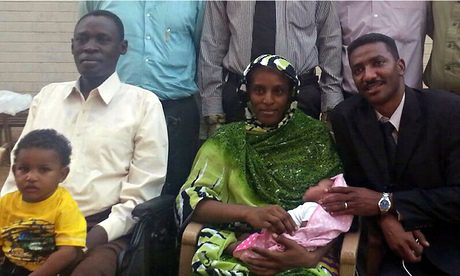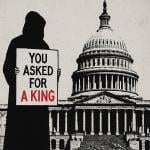This is good news: “Sudanese woman Meriam Ibrahim ‘safe and well’ in US embassy.” The Guardian reports:
The husband of a Sudanese Christian woman facing threats after her apostasy death sentence was overturned has expressed relief that the family has been given refuge at the US embassy in Khartoum.
“Really, it’s good,” Daniel Wani, the American husband of Meriam Ibrahim, told Agence France-Presse by telephone on Friday, adding that embassy staff had been “very helpful and very nice”.
He said his wife and two children, who could be heard in the background, were doing well at the heavily guarded facility.
Ibrahim, 27, went to the US embassy on Thursday after being detained at Khartoum airport as she tried to leave Sudan. Her arrest came days after her release from death row.
Wani confirmed they had sought the embassy’s protection because of death threats against his wife.
A US State Department spokeswoman, Marie Harf, said the family were in a safe location. …

International pressure and public outcry enabled the State Department to do its job, granting refuge to Ibrahim and her family.
Here’s hoping that public outcry doesn’t take a nasty partisan turn after the fact the way the rescue of American POW Bowe Bergdahl did. Ibrahim, like Bergdahl, has suffered too much already and doesn’t need to be subjected to the vile attacks the American right wing directs at anyone who has been helped by the Obama administration.
Sudan’s “apostasy” laws are an extreme example of the problems created by any law “respecting an establishment of religion.” As America’s First Amendment argues, and as Ibrahim’s case illustrates, the establishment of religion in any form makes the free exercise of religion in any form impossible. This is true not just for “apostates” — religious minorities and dissenters from the privileged official religion — but for adherents of the official religion itself.
Sudan’s apostasy law makes it illegal for any Sudanese citizen to convert to any other religion other than the form of Islam mandated by the Sudanese government. That law means that no one can become a Christian, or an atheist, or a Hindu, in Sudan. But that law also means that no one can be a faithful Muslim in Sudan. It makes coercion — the threat of arrest and execution — a part of every Sudanese citizens’ faith, and that casts doubt on every Sudanese citizens’ faith. No one’s religious devotion can be wholly sincere when it is maintained, in part, because there’s a gun to their head threatening to kill them if they think, believe or choose otherwise.
American Christians spoke out on behalf of Meriam Ibrahim. That’s good. American Christians should be speaking out on behalf of prisoners of conscience — but not only on behalf of their fellow Christians. We should also be defending the religious liberty of people like Asif Mohiuddin — one of four atheist bloggers jailed in Bangladesh. And we should be defending the freedom of conscience of people like Ossama Mohamed Bahloul, whose Islamic congregation has faced legal harassment and threats of arson and violence in the far-off land of Murfreesboro, Tennessee.
Jesus’ followers should remember what Jesus commanded them: If you defend only those of your own religious tribe, what credit is that to you? Every other tribe defends its own, for even sinners love those who love them.
















